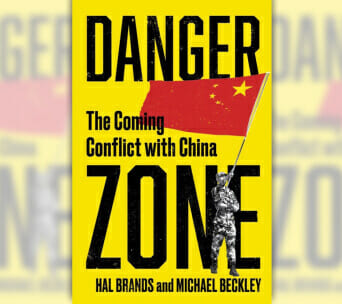On Wednesday, October 5, the Asia Policy Program, the Clements Center for National Security, the America in the World Consortium, the Clark Center for Australian & New Zealand Studies, and the Center for East Asian Studies are hosting Hal Brands, Henry A. Kissinger Distinguished Professor of Global Affairs at the Johns Hopkins School of Advanced International Studies (SAIS), for a book talk on his upcoming release with Michael Beckley Danger Zone: The Coming Conflict with China. Join us at 12:15 PM at RLP 1.302B, Robert L. Patton Hall. The Asia Policy Program is a joint effort of the Clements Center for National Security and the Strauss Center for International Security and Law.
It has become conventional wisdom that America and China are running a “superpower marathon” that may last a century. Yet Hal Brands and Michael Beckley pose a counterintuitive question: What if the sharpest phase of that competition is more like a decade-long sprint?
The Sino-American contest is driven by clashing geopolitical interests and a stark ideological dispute over whether authoritarianism or democracy will dominate the 21st century. But both history and China’s current trajectory suggest that this rivalry will reach its moment of maximum danger in the 2020s.
China is at a perilous moment: strong enough to violently challenge the existing order, yet losing confidence that time is on its side. Numerous examples from antiquity to the present show that rising powers become most aggressive when their fortunes fade, their difficulties multiply, and they realize they must achieve their ambitions now or miss the chance to do so forever. China has already started down this path. Witness its aggression toward Taiwan, its record-breaking military buildup, and its efforts to dominate the critical technologies that will shape the world’s future.
Over the long run, the Chinese challenge will most likely prove more manageable than many pessimists currently believe―but during the 2020s, the pace of Sino-American conflict will accelerate, and the prospect of war will be frighteningly real. America, Brands and Beckley argue, will still need a sustainable approach to winning a protracted global competition. But first, it needs a near-term strategy for navigating the danger zone ahead.
BIOGRAPHY
Hal Brands is the Henry A. Kissinger Distinguished Professor of Global Affairs at the Johns Hopkins School of Advanced International Studies (SAIS) and a Senior Fellow at the Center for Strategic and Budgetary Assessments (CSBA). He is also a columnist for Bloomberg Opinion. He is the author or editor of several books, including American Grand Strategy in the Age of Trump (2018), Making the Unipolar Moment: U.S. Foreign Policy and the Rise of the Post-Cold War Order (2016), What Good is Grand Strategy? Power and Purpose in American Statecraft from Harry S. Truman to George W. Bush (2014), Latin America’s Cold War (2010), From Berlin to Baghdad: America’s Search for Purpose in the Post-Cold War World (2008), and The Power of the Past: History and Statecraft (co-edited with Jeremi Suri, 2015). His newest book is The Lessons of Tragedy: Statecraft and World Order, co-authored with Charles Edel.
Hal served as Special Assistant to the Secretary of Defense for Strategic Planning from 2015 to 2016, and has been a Council on Foreign Relations International Affairs Fellow. He has also consulted with a range of government offices and agencies in the intelligence and national security communities and served as lead writer for the Commission on the National Defense Strategy for the United States.
Hal received his BA from Stanford University (2005) and his PhD from Yale University (2009). He previously worked at Duke University’s Sanford School of Public Policy and the Institute for Defense Analyses. He lives in Maryland with his wife and two children.



